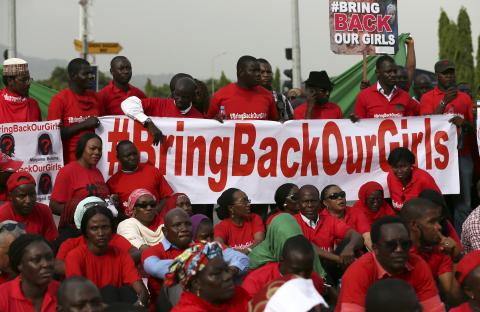Advertisement
Nigerian Police Ban Protests In Abuja Over Abducted Girls
LAGOS (Reuters) - Nigerian police have banned any more protests in the capital Abuja concerning a group of schoolgirls abducted by Boko Haram, saying they could be hijacked by "dangerous elements", the police said on Monday.
Nigeria has seen near-daily protests over the abduction and continued detention of more than 200 school girls by the Boko Haram Islamist militant group, but much of the anger has been focused on the government for failing to protect them.
They were snatched from the remote northeastern village of Chibok, near the Cameroon border, on April 14.
Officials close to President Goodluck Jonathan say the protests are unfairly directed at the government and security forces when they should be protesting against the rebels.
"As the FCT (Federal Capital Territory) police boss, I cannot fold my hands and watch this lawlessness," police commissioner Joseph Mbu was quoted by the state-owned News Agency of Nigeria (NAN) as saying.
"Information reaching us is that too soon, dangerous elements will join groups under the guise of protest and detonate explosives aimed at embarrassing the government."
An international campaign to get the girls freed has shone the spotlight on Nigeria's violent 5-year-old Islamist insurgency, which has killed thousands since 2009.
The campaign triggered pledges of international support to rescue the girls and United States troops are in neighbouring Chad on a mission to find them.
Mbu added that the venue for the Abuja protest, the 'Fountain of Unity' had become a place for "cooking and selling" by hawkers to the protesters, which he said was a "nuisance".
The government has been repeatedly criticised for failing to protect civilians in the northeast. At least 530 civilians have been killed since the day of the girls' abduction, according to a Reuters count.
But authorities say any attempt to rescue the girls would be fraught with danger, as they are most likely separated into groups. Freeing one group, even if they came out alive, would endanger the others.



















Add new comment